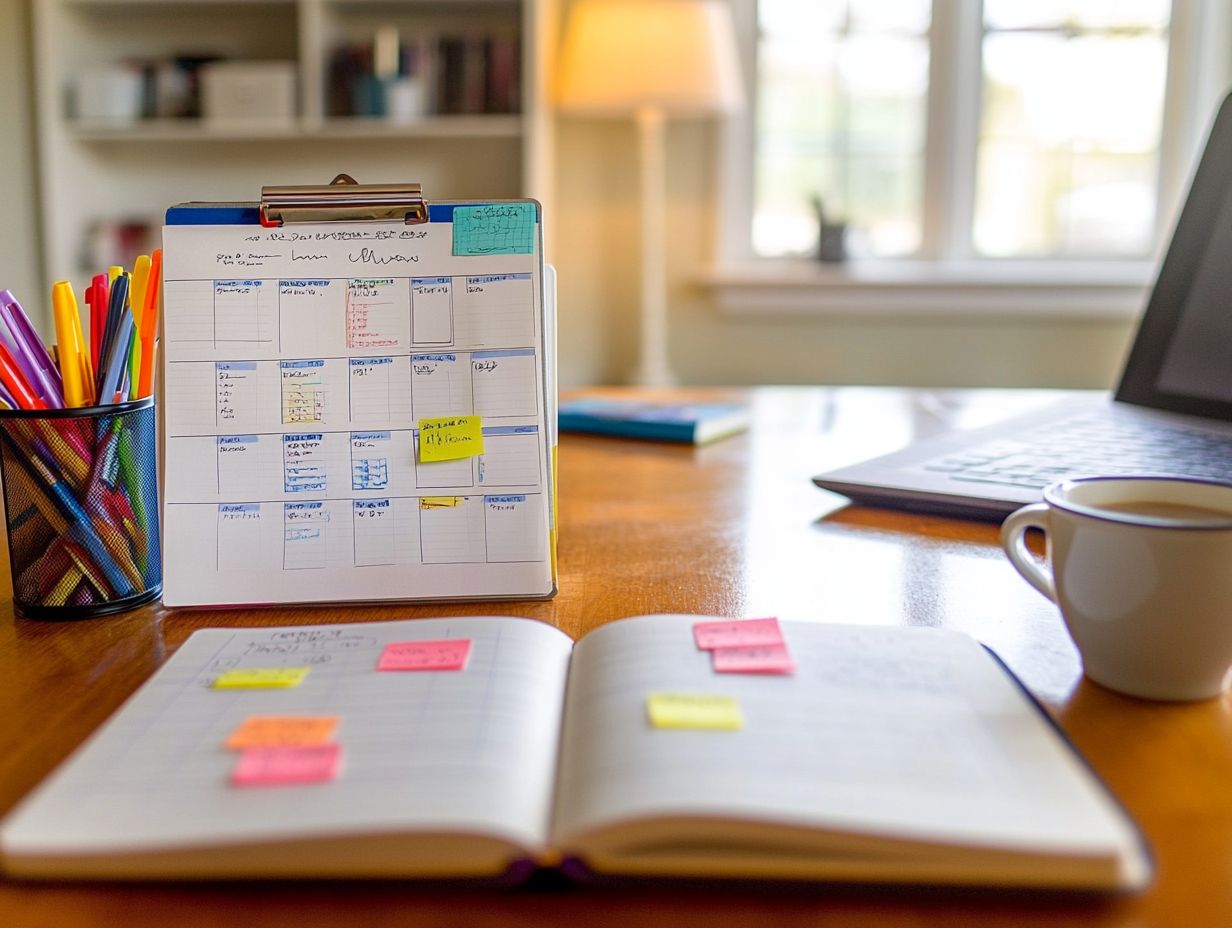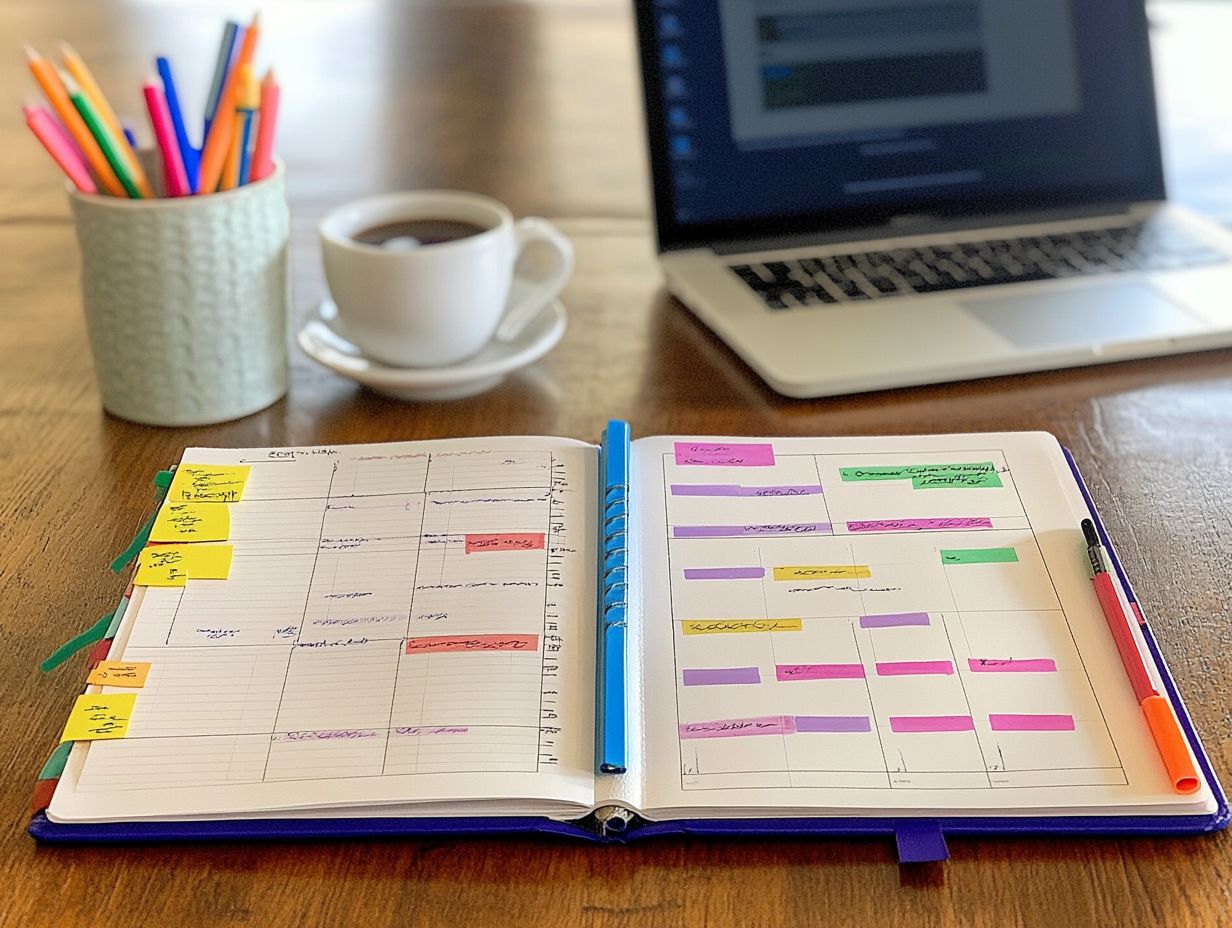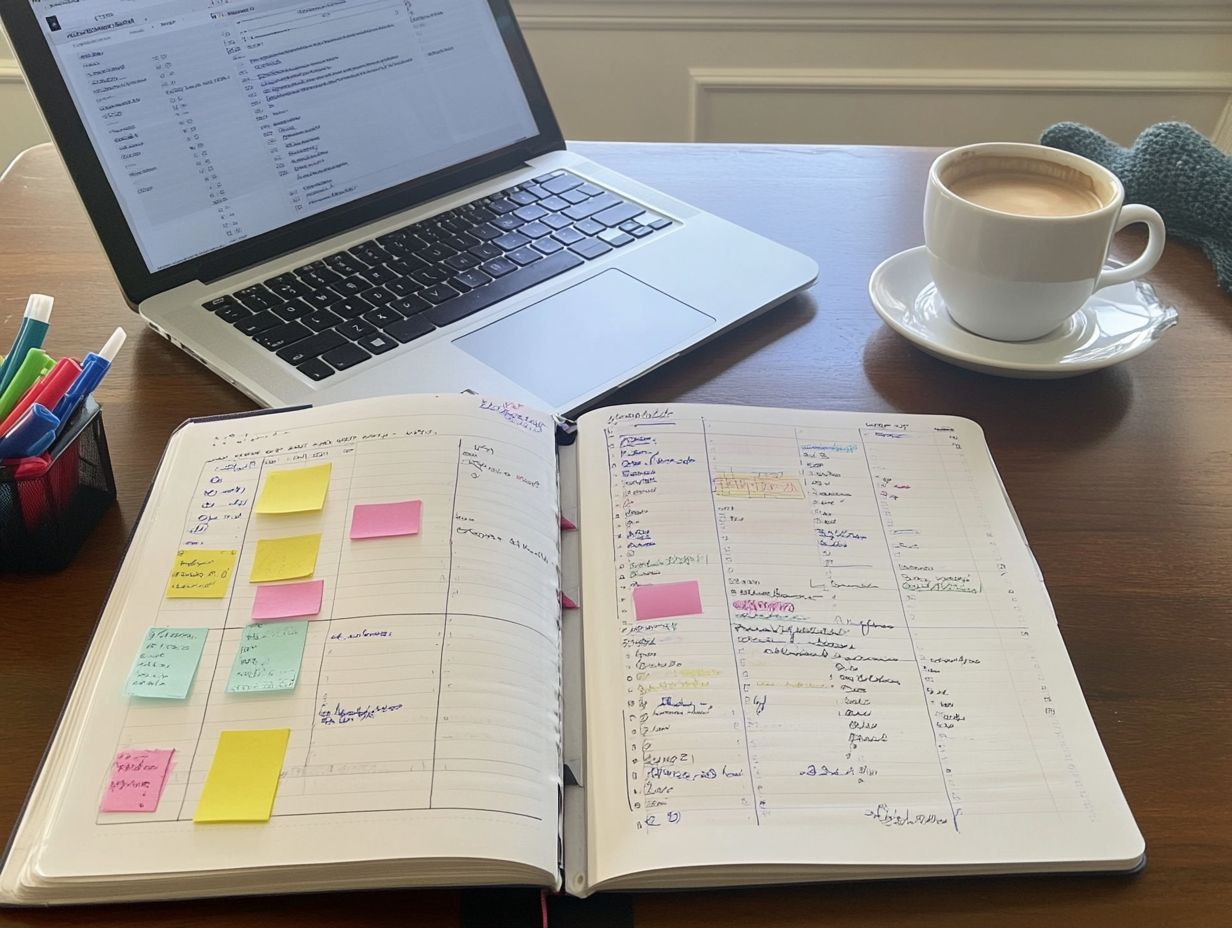How to Create a Study Schedule for Certification?
Creating a study schedule for your certification goes beyond simply marking dates on a calendar; it s a strategic blueprint designed to help you master intricate material and achieve success.
This article delves into the many benefits of having a structured study plan while highlighting essential factors to consider, such as your personal learning style and the resources at your disposal.
You ll uncover actionable steps to craft an effective schedule, complete with strategies for maintaining motivation and adapting when necessary.
Unlock your potential with a study schedule that leads to certification success!
Contents
- Key Takeaways:
- The Importance of a Study Schedule for Certification
- Factors to Consider When Creating a Study Schedule
- Steps to Create an Effective Study Schedule
- Tips for Sticking to Your Study Schedule
- Frequently Asked Questions
- What s the best way to create my study schedule for certification?
- Why is creating a study schedule for certification important?
- How do I create a study schedule for certification?
- Should I stick strictly to my study schedule for certification?
- What are some tips for creating an effective study schedule for certification?
- Can I use a study schedule for certification for multiple exams?
Key Takeaways:

- A study schedule is essential for certification exams as it helps you stay organized, focused, and on track to achieve your goals.
- Consider your learning style, available time and resources, and the exam date and content when creating a study schedule.
- Set realistic goals, break down material, create a schedule template, and include breaks and review time.
- Stay accountable and motivated by adjusting as needed.
The Importance of a Study Schedule for Certification
A well-structured study schedule is essential for your academic success, especially as you pursue certification in your chosen field. To enhance your preparation, consider learning how to find study groups for certification exams. Think of your schedule as your personal roadmap, guiding you to allocate time effectively for studying a range of materials, from quizzes and tests to major exams.
Adopting techniques like the Pomodoro Technique, a time management method that uses short bursts of study followed by breaks, sharpens your focus during study sessions. A balanced schedule gives you the power to manage your time wisely, integrating study habits with extracurricular activities.
This approach not only paves the way for achieving your immediate goals but also sets you up for long-term success in your educational journey.
Benefits of Having a Study Schedule
Having a study schedule brings a multitude of benefits that can significantly elevate your study habits and overall academic performance.
It promotes efficient and productive learning by ensuring you allocate specific time blocks to different subjects or study materials, including quizzes and tests. This approach keeps you organized and focused.
With a structured schedule, you enhance your time management skills, allowing you to make the most of your study hours. It gives you the power to set both short-term and long-term academic goals.
By establishing clear targets, you can effectively track your progress and maintain your motivation. Using a study planner helps break down complex subjects into manageable tasks, reducing feelings of overwhelm and promoting consistency.
Regularly reviewing your notes and study guides keeps the information fresh in your memory, enhancing retention and recall during exams. Ultimately, this well-rounded method fosters a disciplined study routine that can lead to greater academic success.
Factors to Consider When Creating a Study Schedule
Crafting a study schedule that truly works for you demands thoughtful reflection on several key factors, including your unique learning style, the time you have at your disposal, and the resources available to you.
By recognizing whether you learn best through auditory, visual, or kinesthetic means, you can tailor your approach to absorb study materials be it paper projects or exam content more effectively.
Keeping track of deadlines for papers and major exams gives you the power to prioritize your study sessions with precision, ensuring you re always ahead of the curve.
Personal Learning Style
Understanding your personal learning style is essential for tailoring your study techniques for maximum effectiveness. You might discover that visual aids work wonders for you, while others may thrive on auditory methods or hands-on activities.
Recognizing these unique preferences can greatly enhance your ability to absorb and retain information. For instance, if you’re a visual learner, colorful charts and diagrams could be your best friends, making complex concepts much clearer.
If you lean toward auditory learning, listening to lectures or engaging in discussions helps you retain knowledge more effectively.
If you identify as a kinesthetic learner, you’ll likely flourish in environments that allow for movement and manipulation of materials, which can invigorate your understanding.
By implementing review strategies that align with your learning style, you can ensure your study sessions are not only productive but also enjoyable, leading to a deeper comprehension of the material at hand.
Available Time and Resources

Your available time and resources significantly influence your study schedule, determining how you efficiently allocate your study hours. Effective time management means analyzing your daily commitments and using study materials such as textbooks, online articles, and digital calendars to enhance your organization.
By carefully assessing your available time, you can pinpoint the optimal study periods, aligning your sessions with peak productivity moments throughout the day. A digital calendar keeps you accountable and allows for easy tracking of deadlines and study goals. This visual tool helps maintain focus and avoids the chaos of last-minute cramming.
You can streamline finding the right study materials by exploring reputable educational websites, joining study groups, or seeking recommendations from peers or mentors. This ensures the resources you choose align with the specific objectives you’ve set in your study plan.
Exam Date and Content
Exam dates and content outlines shape the urgency and focus of your study sessions, making them essential for crafting an effective study schedule. Knowing when major exams or paper deadlines are due allows you to prioritize your study topics accordingly.
Incorporating these deadlines into your planning helps you allocate time for both revision and the absorption of new material, ensuring you won’t miss important topics. Regularly reviewing content solidifies your understanding and creates a positive feedback loop that enhances retention, empowering you to approach exams with confidence.
Make sure to evaluate your study schedule regularly against these looming deadlines. This way, you can make necessary adjustments to ensure that no subject or area is left unprepared.
By establishing regular checkpoints to assess your progress, you can ensure you remain on course and make informed decisions about where to concentrate your efforts as exam day draws near.
Steps to Create an Effective Study Schedule
Creating an effective study schedule requires careful consideration, beginning with setting realistic goals that resonate with your academic aspirations.
By breaking down the material into manageable sections, you can approach each study session with clarity and purpose, ensuring that your time spent reviewing study guides and notes is productive and focused.
This strategic approach allows you to make the most of your efforts, paving the way for academic success.
Setting Realistic Goals
Setting realistic goals is essential for the success of your study plan, as it directly influences your commitment to studying and your overall academic achievements.
These goals should be Specific, Measurable, Achievable, Relevant, and Time-bound (SMART) to keep you on track.
By crafting SMART objectives, you can clarify your intentions and create a roadmap that effectively guides your efforts. Aligning these goals with your broader academic aspirations boosts your motivation and helps you prioritize tasks efficiently.
This alignment ensures that every effort you make contributes meaningfully to your long-term success.
Cultivating self-discipline is crucial for maintaining focus and sticking to these established goals. When distractions come knocking, having a clear set of SMART goals serves as a reminder of what truly matters, empowering you to navigate challenges with resilience and determination.
Start planning your study schedule today and watch your confidence soar!
Breaking Down Material
Breaking down material into smaller, digestible parts is essential for your study sessions. This method helps you handle each topic one at a time.
This technique keeps your focus sharp and enhances your retention of study materials. By categorizing subjects into manageable units like chapters from a textbook or individual concepts from a lecture you can learn more effectively.
Techniques like summarizing key ideas and creating mind maps help clarify how these parts connect. Engaging in effective review strategies, such as quizzing yourself or discussing topics with peers, allows you to synthesize the information you ve gathered.
Spacing out your study sessions helps the material settle and reduces the chance of feeling overwhelmed.
Creating a Schedule Template

A schedule template acts as your visual guide. It organizes your study sessions and commitments while maximizing the benefits of a digital calendar.
This template should clearly show specific time blocks for each subject, letting you grasp your routine at a glance. Using a digital calendar makes it easy to set reminders for your study sessions, ensuring you never miss a deadline.
While sticking to your study schedule is crucial, being flexible is just as important. Adjust your time blocks based on your energy levels or unexpected events. Setting aside buffer times helps you adapt without feeling overwhelmed.
Including Breaks and Review Time
Including breaks and review time in your study schedule is vital. Breaks refresh your mind while review time reinforces what you ve learned.
Research shows that the brain can only focus intensely for limited periods. The Pomodoro technique is a great option study for 25 minutes, then take a 5-minute break.
Planning weekly review sessions reinforces your material and avoids cramming. Use self-assessment methods, like practice quizzes, to gain insights into your strengths and weaknesses.
This way, when exam day arrives, you ll feel confident and ready to tackle any challenges.
Tips for Sticking to Your Study Schedule
Following your study schedule requires a blend of accountability and motivation. These elements are crucial for staying dedicated to academic excellence.
By creating a structured routine and identifying ways to stay motivated, you can strengthen your commitment to studying and achieve your goals.
Accountability and Motivation
Accountability and motivation are key to successfully following your study schedule. They provide the support you need to reach your academic goals.
Partnering with a study buddy boosts both accountability and motivation. You can share insights and encourage each other.
Regular check-ins with your partner can help you stay on track. Together, you can review progress, overcome challenges, and celebrate your victories!
The psychological benefits of mutual support are significant. It alleviates feelings of isolation and fosters a sense of belonging, which can enhance your academic performance.
Adjusting as Needed
Adjusting your study schedule as needed is crucial for maintaining its effectiveness and ensuring that you re on track to meet your learning goals. Regularly evaluating your schedule and analyzing your study habits allows you to identify areas ripe for improvement and adaptation.
Set aside time each week to reflect on which study techniques yield the best results. This practice enables you to pinpoint both successful strategies and those that may not work as well.
Keeping a study journal or using apps that track the time you spend on each subject can provide valuable insights into your habits. Don t hesitate to seek feedback from peers or educators sometimes, they can highlight aspects of your approach that you might have overlooked.
By remaining open to necessary adjustments, such as changing how you spend your study time or experimenting with various resources, you can significantly enhance your learning efficiency and make more substantial progress toward your objectives.
Frequently Asked Questions

What s the best way to create my study schedule for certification?
A study schedule for certification is a detailed plan that outlines the specific tasks and timelines for preparing and studying for a certification exam. To enhance your study experience, consider strategies on how to stay motivated during certification studies, as it helps individuals stay organized and focused while studying for their certification.
Why is creating a study schedule for certification important?
A study schedule for certification is important because it helps individuals manage their time effectively and ensures that they cover all the necessary material before the exam. For more tips, check out this guide on how to prepare for a certification exam. It also helps reduce stress and increases the chances of success on the certification exam.
How do I create a study schedule for certification?
To create a study schedule, start by setting a realistic timeline for when you want to take the exam. Then, break down the material into manageable chunks and assign specific study tasks for each day or week. For effective planning, consider exploring best practices for certification preparation. Don’t forget to schedule breaks to recharge!
Should I stick strictly to my study schedule for certification?
While it s important to stay on track with your study schedule, being flexible is also crucial. If a particular topic is taking longer than expected, don t hesitate to adjust your schedule to allow for more time. The key is to find a balance between sticking to your schedule and being adaptable.
What are some tips for creating an effective study schedule for certification?
- 1. Set achievable goals and deadlines
- 2. Prioritize your study tasks according to difficulty or importance
- 3. Use a mix of study methods, such as reading, practice questions, and flashcards
- 4. Schedule regular breaks to avoid burnout
- 5. Be consistent and stick to your schedule as much as possible
Can I use a study schedule for certification for multiple exams?
Yes, you can use a study schedule for certification for multiple exams. However, be sure to adjust your schedule based on the specific material and requirements for each exam. It may also be helpful to create a separate schedule for each exam to better manage your time and focus on the specific material.
Ready to ace your certification exam? Start crafting your study schedule today!
If you have any further questions, feel free to ask!






